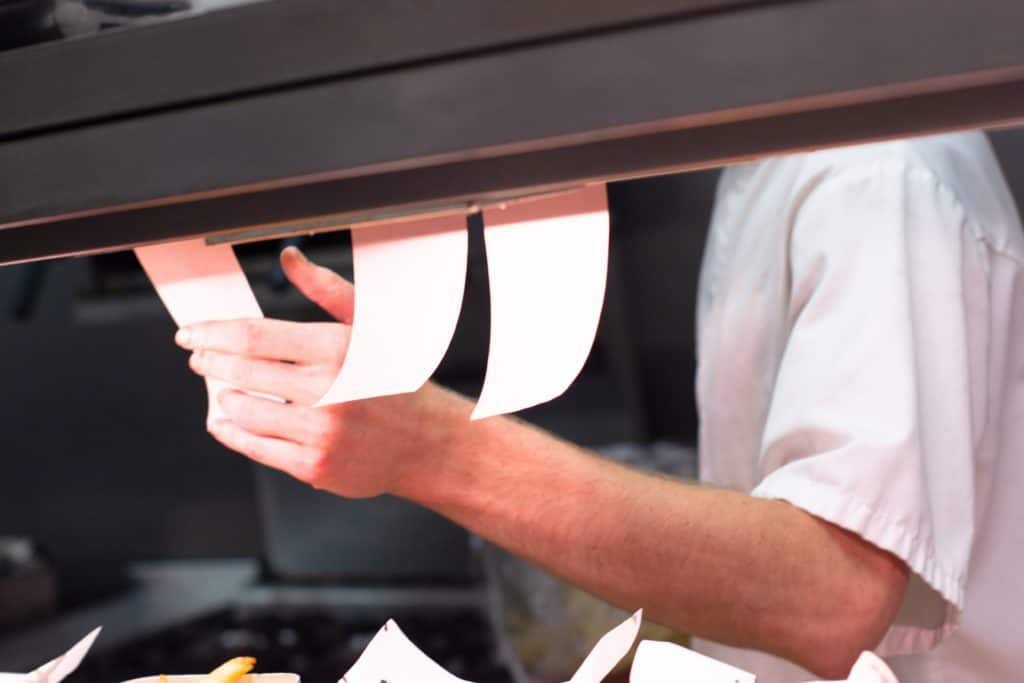
These are lots of great reasons why many people are drawn towards a career as a chef . The camaraderie, the passion, and the excitement are all very appealing.
. The camaraderie, the passion, and the excitement are all very appealing.
However, chances are if you’ve discussed wanting to become a chef with others, one of the first things they will comment is that chefs work a lot of hours.
But why do chefs have to work so many hours?, and why is this the industry standard around the world?
As a chef I had to work long hours for several reasons. The main reason is that I had to be ready for the lunch and dinner service on time, every day. I had to work as many hours as necessary each day to meet this fixed deadline.
As you can see from above, the main reason why chefs work so many hours is the fixed deadline.
In other jobs, employees can juggle work around, possibly catching up at weekends or moving workload to a quieter day. In general chefs cannot do this.
If the food prep is not done before service starts then it is going to be a bumpy ride for everyone concerned!
As well as the fixed deadline, there are several other reasons why chefs work long hours which I will go into detail below. It’s also worth remembering that certain restaurants will require their chefs to work more hours than others.
I also recently wrote an article explaining the shift patterns and working hours that chefs tend to do (I link it Here ). Understanding the shift patterns is a vital part to understanding why such long hours are the norm for chefs.
). Understanding the shift patterns is a vital part to understanding why such long hours are the norm for chefs.
Do Chefs Work Longer Hours In Smaller Kitchens?
In my experience the smaller the kitchen the more hours the chefs working there will have to do. Smaller kitchens provide less space for chefs, therefor a smaller brigade equals a greater amount of work required from each of the chefs who are there.
Many people would be surprised at just how small their favourite restaurant kitchen is. The smaller the kitchen the bigger the dining room, and therefor more room for customers and a greater profit.
The way that the kitchen is set up also has a huge impact on the ease at which the chefs can work and carry out service time.
also has a huge impact on the ease at which the chefs can work and carry out service time.
Smaller kitchens are limited to the amount of chefs that can be in the kitchen at the same time. The smaller the number of chefs that are able to work in there, the greater the workload on the ones that can.
Small kitchens that do a high level of covers are usually the most intense and require the greatest number of hours to be worked.
If you’ve ever tried cooking in your kitchen at home when your partner is also in there trying to cook, you’ll understand how difficult an overcrowded kitchen can be!
Does The Number Of Customers Affect How Many Hours Chefs Have To Work?
Unsurprisingly, the higher the number of customers a restaurant serves in a day the busier the chefs are and the more hours they have to do.
Number of customers is often referred to as number of covers ( 1 person = 1 cover).
When a lunch or evening service is busy the impact is threefold;
- The first factor is that service runs late, causing chefs to finish working later into the night. There is no set finish time
 to the day. If the evening service normally finishes at 10 o’clock but it’s been really busy and a chef is still there serving meals at 11 o’clock then that’s just the way it is.
to the day. If the evening service normally finishes at 10 o’clock but it’s been really busy and a chef is still there serving meals at 11 o’clock then that’s just the way it is.
- The second factor is that a busy service uses up lots of a chefs prep work. So now, as well as finishing the shift later than hoped, we now have extra prep to do because our previous prep work was used up during service!
- A third reason why number of covers is so impact full on hours worked is the amount of food that needs to be prepared, and the time this takes. As an example a chef expecting 50 covers may choose to fillet 10 Sea Bass in advance as preparation. The same chef expecting 100 covers will want to prepare 20 Sea Bass in advance. This obviously takes longer and is the same thought process for each element of the dish.
Does The Standard Of Cuisine Affect How Many Hours Chefs Have To Work?
In my experience as a chef across different cuisine standards, the level of food being produced has an effect on the amount of hours a chef has to work. Higher standard cuisine equals a greater amount of time needing to be worked in order to prepare and serve the dishes.
Restaurants that have a lower standard of cuisine may choose to buy in a lot of their dish elements already prepared, as opposed to a higher standard where the chefs will prepare everything from scratch.
As an example, one kitchen may buy in jars of curry that all they need to do is heat up. A higher standard kitchen will make the curry from scratch. This method of making from scratch is more time consuming.
Even among kitchens that make everything from scratch the level and type of food they produce still have an impact on working hours. Some Head Chefs like simple food done well, where as others like to have lots of complicated elements that take a lot of time.
like simple food done well, where as others like to have lots of complicated elements that take a lot of time.
A side note to illustrate my point; I once watched a commis chef in a 2 Michelin star
in a 2 Michelin star kitchen spend 2 hours removing the stalks from spinach, picking them off by hand. Very time consuming!
kitchen spend 2 hours removing the stalks from spinach, picking them off by hand. Very time consuming!
However, just because a venue has a lower standard of cuisine does not guarantee fewer hours for its chefs. Lots of chain restaurants choose to buy in the bulk of their menu items pre cooked, so they can then simply be reheated.
This allows a kitchen to turn out a large amount of covers very quickly. The management then tend to reduce the amount of cooks required to cut costs, there for the cooks still end up doing a large amount of hours.
required to cut costs, there for the cooks still end up doing a large amount of hours.

Do Chefs Spend A Lot Of Time Experimenting?
As a chef I was expected to be constantly experimenting and coming up with new menu ideas. This experimenting takes time so even when I had finished all my usual work for the day there was still plenty more to do!
Restaurants that are at a high level need to constantly be experimenting with dishes to discover the best techniques and flavour combinations available. This experimenting needs to be done alongside the daily preparation tasks and is usually carried out in break times and after service.
A great example of an experimental chef is Heston Blumenthal (link to his website here ). Those familiar with the famous chef will know that his crazy unique cuisine takes hours and hours of experimenting to achieve.
). Those familiar with the famous chef will know that his crazy unique cuisine takes hours and hours of experimenting to achieve.
Menu Changes Require Chefs To Work Extra Hours
Menu changes are an important part of a successful restaurant. However in my experience they result in a large amount of extra work for the chefs. This extra work ultimately translates into a large number of extra hours at work.
Menu changes require lots of work for several reasons;
- There’s all the new prep work that needs to be done to get ready for the new dishes
- The old prep work is no longer useful, so the chefs are usually having to build up their preparation
 again from scratch.
again from scratch.
- It takes additional time to learn the new dish elements. Whenever cooking anything for the first time there is a need to be slower and more methodical to make sure it comes out right.
- The menu has to be planned and taste tested whilst the old menu is still being used. This testing needs to be done in addition to the chefs daily work load.
- Service is slower and tends to take longer as the whole kitchen team work out the kinks to the new menu and discover the quickest and best ways to do things.
- Additional time is needed to source the ingredients and liaise with the suppliers.
Do Chefs Have To Work Overtime To Repair Their Mistakes?
Depending on the size of the mistake that has been made, it may involve the individual chef working extra hours or, in the case of huge mistakes, the whole kitchen team has to work extra hours to rectify the situation.
Mistakes can range from little ones like overcooking a pasta portion to mistakes of epic proportion such as dropping a freshly cooked beef wellington. All mistakes take time to rectify.
Does A Chefs Position In The Kitchen Affect The Number Of Hours They Have To Work?
The position which a chef holds within the kitchen rank structure has an effect on the amount of hours they have to work. In my experience, head chefs can typically choose to leave earlier or come into the kitchen later if they so wish
- Commis Chefs
 through to Sous Chefs
through to Sous Chefs tend to work a similar amount of hours. Trainee commis
tend to work a similar amount of hours. Trainee commis tend to do slightly less as they are not yet capable of performing so many duties. There is also usually an awareness that new staff members benefit from being introduced to the kitchen slowly rather than being thrown in at the deep end.
tend to do slightly less as they are not yet capable of performing so many duties. There is also usually an awareness that new staff members benefit from being introduced to the kitchen slowly rather than being thrown in at the deep end.
- In larger kitchens, Head Chefs
 spend less time during the day on the general prep work and more time dealing with the general running of the kitchen. Head Chefs will typically not do breakfast shifts and spend a portion of their day in the office.
spend less time during the day on the general prep work and more time dealing with the general running of the kitchen. Head Chefs will typically not do breakfast shifts and spend a portion of their day in the office.
- Executive Chefs
 oversee several different restaurants and only pop in from time to time to discuss menu planning and the running of the kitchen. It is rare to see an executive chef in a kitchen during an evening as they tend to work normal hours during the day.
oversee several different restaurants and only pop in from time to time to discuss menu planning and the running of the kitchen. It is rare to see an executive chef in a kitchen during an evening as they tend to work normal hours during the day.
You can learn much more about the kitchen rank structure in this article here!
To Sum Up
There are a host of reasons why chefs are required to work a high number of hours. Perhaps one of the most important reasons, that has not yet been covered, is the fact that chefs have a passion for cooking and view their chosen career as a vocation rather than a job.
While some chefs begrudge the amount of working hours  they do, others relish in the fact that they get to do what they love for a living, and enjoy spending as much time as possible in the kitchen.
they do, others relish in the fact that they get to do what they love for a living, and enjoy spending as much time as possible in the kitchen.
